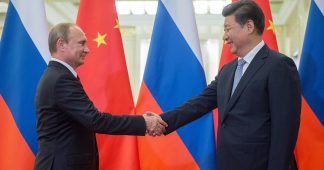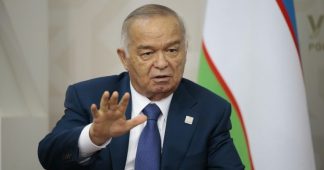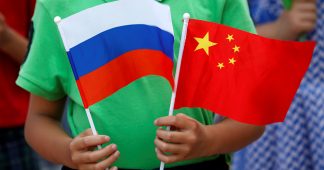By Keith Jones
The Obama administration has signaled its support for India’s “surgical” cross-border military strikes carried out Wednesday night in Pakistan-held Kashmir.
India’s attack was patently illegal and highly provocative. US strategic think tanks frequently refer to disputed Kashmir as the most dangerous “nuclear flashpoint” in the world. Yet American officials have studiously avoided making any criticism of India, a “global strategic partner” of US imperialism and pillar of its military-strategic offensive against China.
A chorus of former Obama and Bush administration officials now employed by various military-strategic think tanks are lauding the Indian action and even praising New Delhi for its “restraint,” even as the Hindu supremacist BJP government of Prime Minister Narendra Modi pushes South Asia closer to the precipice of all-out war.
India claims it sent ground forces, paratroops and attack helicopters to more than a half-dozen places up to three kilometers inside Azad, or Pakistan-Occupied Kashmir. It boasts that it inflicted “heavy,” “double-digit” casualties on “terrorists and those trying to shield them.”
Pakistan, while contesting the Indian version of events, concedes that two of its soldiers were killed and nine wounded Wednesday night.
The strikes represent a dangerous new turn in India’s strategy toward Pakistan. This is underscored by the fact that they are being celebrated not only by India’s virulently right-wing BJP government, but by the entire political establishment and corporate media. The attacks are being hailed as proof of a stronger, bolder India, which has thrown off the shackles of “strategic restraint.”
For more than four decades, India had not conducted military operations inside Pakistan. Or, to be more precise, any actions it did carry out were kept secret, with the aim of avoiding escalating strikes and counterstrikes that could quickly lead to war and even nuclear conflict.
Washington’s readiness to endorse India’s new aggressive posture is utterly reckless. It will only encourage New Delhi to take still greater military-strategic risks. It exemplifies the highly destabilizing role being played in South Asia by US imperialism and its “pivot to Asia.” Particularly incendiary is Washington’s drive to make India a “frontline” state in its offensive to encircle and prepare for war against China.
When questioned Thursday about Washington’s attitude toward the Indian strikes, Obama administration officials repeatedly evaded giving a straight answer. Instead, they issued general, pro-forma calls for both sides to show restraint and engage in dialogue, while insisting that Pakistan had to do more to prevent cross-border “terrorism.”
So anxious was US State Department spokesman John Kirby to shift attention from the Indian military strikes that at one point during his press briefing he apparently became flustered. He misinterpreted a question about whether the Indian strikes constituted the type of “escalation” that “Secretary Kerry had cautioned against,” and took it to be a reference to the September 18 terrorist attack on the Uri military base in India-held Kashmir.
Pressed as to whether the Indian strikes constituted an “escalation,” Kirby again ducked the question, while suggesting, as New Delhi does, that “terrorism” is the central cause of India-Pakistan tensions. “Our message to both sides has been the same,” declared Kirby, “in terms of encouraging them to increase communication to deal with [the terrorist] threat and to avoid steps that escalate the tensions. And I’m…not going to get into characterizing each and every step along the way there.”
It is likely that Washington had advance warning India was going to attack Pakistan and gave New Delhi a green light. In the run-up to Wednesday night’s attack, there was a flurry of phone calls between top US and Indian officials, including conversations between US Secretary of State John Kerry and his Indian counterpart, Sushma Swaraj, and between US National Security Adviser Susan Rice and her Indian counterpart, Ajit Doval.
What is incontrovertible is that in the aftermath of India throwing off “strategic restraint” to attack Pakistan, the Obama administration has signaled its support, although it finds it politic—under conditions where the Pentagon remains dependent on Pakistan’s logistical support to maintain the US-NATO occupation of Afghanistan—not to go on record as publicly endorsing Indian strikes in Pakistan.
Ex-US government officials are under no such constraints and they have been lining up to voice support for India’s new and more aggressive military-strategic posture.
Bruce Riedel, a longtime CIA analyst and former AfPak War adviser to the Obama administration, told the Hindustan Times that India was within its rights to attack Pakistan, citing as a precedent Washington’s illegal Predator drone strikes and other violations of Pakistan sovereignty. “India,” said Riedel, “can note that the United States has been carrying out attacks in Pakistan for over a decade to kill terrorists, including Osama bin Laden and Mullah Mansour (the Afghan Taliban chief summarily executed last May).”
Ashley Tellis, who in the administration of George W. Bush played a key role in negotiating the 2008 Indo-US civil nuclear accord, was no less emphatic in support of India’s attack. Indian Prime Minister Modi, he told the Press Trust of India, “could not let the outrage at Uri go unanswered.”
Tellis praised the Indian action as “carefully measured.” Invoking New Delhi’s transparent, trumped-up pretext for the attack, that Pakistan was about to launch terrorist squads across the border, Tellis added, “Striking at terrorist launch pads was meant to signal that India has not lost its freedom to retaliate, but puts the onus of further escalation on Pakistan.”
John Blank, a former South Asian policy adviser to the US Senate Foreign Relations Committee and currently a Rand Corporation analyst,” said “any (US) criticism of India for a cross-border action would have seemed hypocritical,” given its own “surgical strike against Obama bin Laden in Abbottabad (Pakistan).”
Blank pointed to the significance of the Wednesday evening phone call between the Indian and US national security advisers. “The phone call between Ajit Doval and Susan Rice…enlisted the US to help prevent a Pakistani counter-strike.”
During the Cold War, Pakistan was a key US ally. Washington armed its military and encouraged it in its reactionary military-strategic rivalry with India, which, after 1971, was formally allied with the Soviet Union by a “Treaty of Peace, Friendship and Cooperation.”
The US subcontracted to Pakistani intelligence the training of the Afghan mujahedeen and allied Arab fundamentalist forces it used in the 1980s to bleed the Soviet Union in a proxy war in Afghanistan, while backing to the hilt Pakistan’s Islamist dictator Zia ul-Haq.
But since the turn of this century, Washington has been seeking to build up India as a counterweight to China, and since Obama launched the “pivot to Asia” in 2011, the US has sought to make India the fourth pillar of an anti-China alliance alongside its key Asian-Pacific allies, Japan and Australia.
Building on the Indo-US “global strategic partnership” forged by the previous Congress Party-led government, the 28-month-old BJP regime has, to Washington’s delight, dramatically expanded India’s integration into the “pivot.” This has included adopting the Obama administration’s provocative stance on the South China Sea, expanding bilateral and trilateral ties with Japan and Australia, and agreeing to allow US warplanes and battleships to make routine use of Indian bases for resupply and repair and the forward deployment of war materiel.
In conjunction with this shift, the Modi government has pursued a more aggressive policy against Pakistan and China, which has developed extensive economic ties in South Asia. Under Modi, India is asserting itself as the regional hegemon. This has involved diplomatic and political thrusts as well as major new arms purchases and aggressive military deployments on its borders.
In the face of the burgeoning threat from the Indo-US alliance, Beijing and Islamabad have strengthened their own longstanding strategic ties.
Already on the first anniversary of the Modi government’s coming to office, the aforementioned Riedel noted that “the bipolar alliance system in South Asia has hardened… the United States and India are closer to each other, and China and Pakistan have come much closer together.”
A key element in this is the China Pakistan Economic Corridor (CPEC), a $46 billion network of rail, road, pipeline and power projects linking western China to Pakistan’s Arabian Sea port of Gwadar.
India is mounting a very public campaign against the CPEC because it will provide a huge and desperately needed economic shot in the arm to Pakistan and because it fears Gwadar could ultimately serve as an Indian Ocean base for the Chinese Navy.
The US has left it to India to publicly campaign against the CPEC, on the grounds that it will pass through parts of the former British Empire princely state of Jammu and Kashmir, which India claims is rightfully hers. But there is no question that Washington also views the CPEC as a strategic threat, as it would enable Beijing to circumvent US plans to impose an economic blockade on China using Indian Ocean and South China Sea chokepoints in the event of a war or war crisis.
Washington’s support for Wednesday’s Indian strikes on Pakistan involves more than a desire to cement its alliance with India. Its relations with Pakistan are badly frayed and increasingly characterized by bitterness and suspicion, in part because of Islamabad’s attempt to ensure itself a major say in any political settlement of the Afghan war by retaining ties to sections of the Taliban, especially the Haqqani network. But even more fundamental are Pakistan’s close ties to China, the power Washington has identified as the principal obstacle to US domination of Eurasia.











